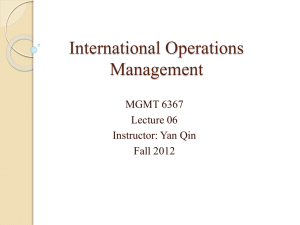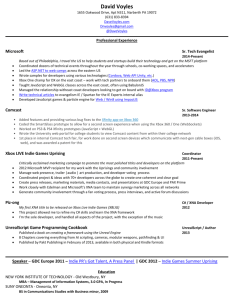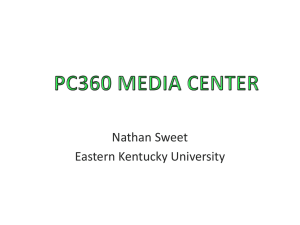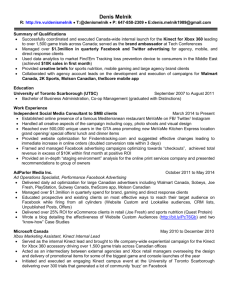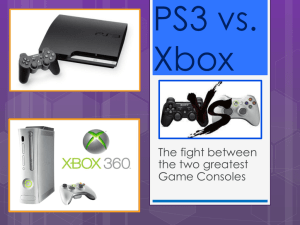- Microsoft
advertisement
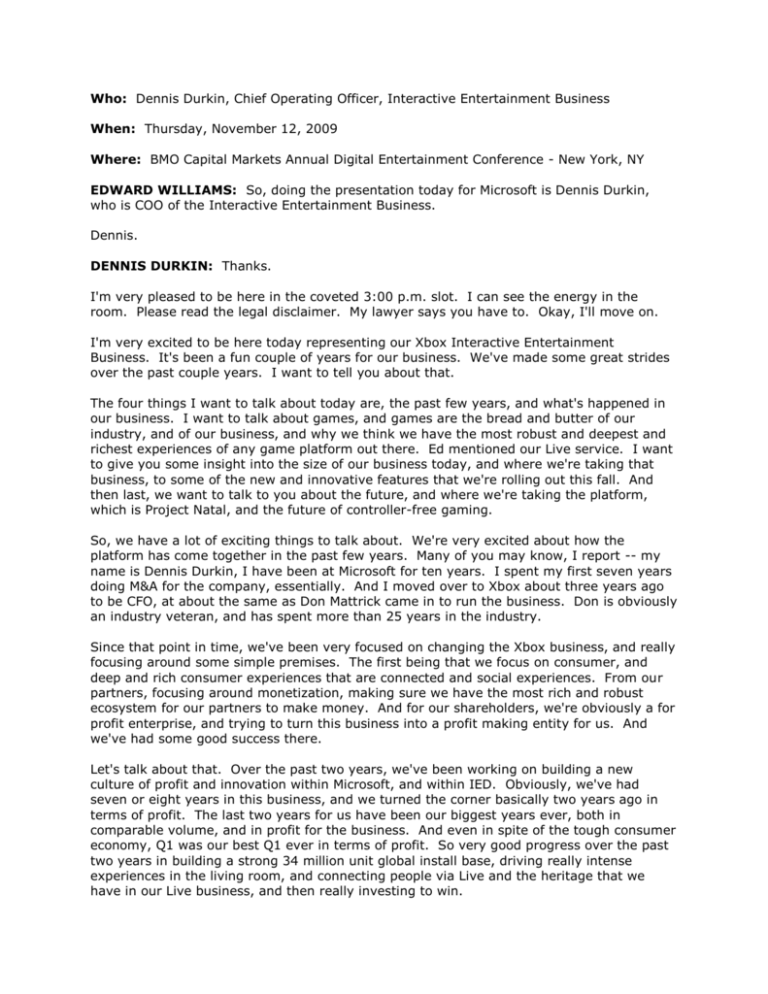
Who: Dennis Durkin, Chief Operating Officer, Interactive Entertainment Business When: Thursday, November 12, 2009 Where: BMO Capital Markets Annual Digital Entertainment Conference - New York, NY EDWARD WILLIAMS: So, doing the presentation today for Microsoft is Dennis Durkin, who is COO of the Interactive Entertainment Business. Dennis. DENNIS DURKIN: Thanks. I'm very pleased to be here in the coveted 3:00 p.m. slot. I can see the energy in the room. Please read the legal disclaimer. My lawyer says you have to. Okay, I'll move on. I'm very excited to be here today representing our Xbox Interactive Entertainment Business. It's been a fun couple of years for our business. We've made some great strides over the past couple years. I want to tell you about that. The four things I want to talk about today are, the past few years, and what's happened in our business. I want to talk about games, and games are the bread and butter of our industry, and of our business, and why we think we have the most robust and deepest and richest experiences of any game platform out there. Ed mentioned our Live service. I want to give you some insight into the size of our business today, and where we're taking that business, to some of the new and innovative features that we're rolling out this fall. And then last, we want to talk to you about the future, and where we're taking the platform, which is Project Natal, and the future of controller-free gaming. So, we have a lot of exciting things to talk about. We're very excited about how the platform has come together in the past few years. Many of you may know, I report -- my name is Dennis Durkin, I have been at Microsoft for ten years. I spent my first seven years doing M&A for the company, essentially. And I moved over to Xbox about three years ago to be CFO, at about the same as Don Mattrick came in to run the business. Don is obviously an industry veteran, and has spent more than 25 years in the industry. Since that point in time, we've been very focused on changing the Xbox business, and really focusing around some simple premises. The first being that we focus on consumer, and deep and rich consumer experiences that are connected and social experiences. From our partners, focusing around monetization, making sure we have the most rich and robust ecosystem for our partners to make money. And for our shareholders, we're obviously a for profit enterprise, and trying to turn this business into a profit making entity for us. And we've had some good success there. Let's talk about that. Over the past two years, we've been working on building a new culture of profit and innovation within Microsoft, and within IED. Obviously, we've had seven or eight years in this business, and we turned the corner basically two years ago in terms of profit. The last two years for us have been our biggest years ever, both in comparable volume, and in profit for the business. And even in spite of the tough consumer economy, Q1 was our best Q1 ever in terms of profit. So very good progress over the past two years in building a strong 34 million unit global install base, driving really intense experiences in the living room, and connecting people via Live and the heritage that we have in our Live business, and then really investing to win. So, we have a great heritage in services, and taking that and combining with Natal and investing for the future to really drive value in the category. So, in spite of where the cautious consumer is today, and obviously all the uncertainty that faces our category, we're super excited about where we are, and where we're positioned. Let's talk about games. Games for us is the heart and soul of our business. We pride ourselves on having the best and richest experience of any platform. And it shows up in the attach rates that we've seen in our games business. We have the highest attach rate of any console at any point in this generation. We're focused on really making sure that we have the best experiences on our platform, whether those be first party or third party experiences. Our first party has led the way. We have great experiences, and they continue to deliver this fall, Halo ODST went on store shelves on September 24th. Very strong, another continuation of what is a multi-billion dollar franchise, unbelievable online game play, a great driver of our Live business, and it's has similar results of the past title, more than three million units have sold of this title. So, feeling very good about the start for that. Forza Motorsport came out just at the end of October. It's the definitive racing came of this generation, 92 meta critics rating, and is off to a very, very strong start. Again, we've worked on making sure it's not just a sim, but it's actually a very approachable game for a broader base of gamers, and I think it really delivered on that promise. And then Lips Number 1 Hits is a singing and social game that just launched in the last couple of weeks, which captures the enthusiasm around the music category, and around social experiences in the living room. While first party has definitely been a great leader of us in driving tip of the spear experiences, and Live-enabled experiences and driving our Live interface, but third party is really critical to our success as a platform owner. Microsoft historically has always been a business about making sure that our partners make money, and we believe when our partners make money it's good for us, and we will ultimately make money. And, you know, across many different categories third party games do better on Xbox than they do on other platforms. There are a lot of reasons for that. We think we've got great customers which we covet and we love and we want to embrace and feed, but we also think because of the Live service, and the connection that we have with that customer, really understanding that customer, we're better at merchandising, and keeping that customer engaged with the products that launch on our platform. And we think that's been very valuable to third parties. When you look at revenue, which is the life's blood of all of our third party partners, every month this year we've had the highest third party revenue of any next gen platform, and the same holds true for each of the past calendar years since launch. So, third parties make more money on our platform than on any other platform, which is good for us and we think long-term will be successful. When you look at those big cross-platform titles, of the 25 biggest cross-platform titles, 21 of them sold best on Xbox and derived the most revenue from Xbox. So, again, first party tip of the spear, but third party making sure that we have a very vibrant and robust ecosystem for them to both do well at retail, but then also to keep their connection with their customers over time though Live, and continue to monetize and connect with that user. Call of Duty is obviously a landmark event for our industry. We're very pleased with the partnership that we have with Activision. Not only did they launch obviously a great game, at that time we launched a Limited Edition Super Elite SKU which is basically selling very, very well over the last couple of days. And, you know, Infinity Ward is a great developer, Activision is a great company, and our partnership with them in terms of helping, trying to help make that franchise an even bigger success has really been a great partnership. You know, two days into it, Tuesday was the biggest day we've ever seen on Live. We had more than two million concurrent players at the same time. So, our partnership with Activision is very strong. We're very thankful to have this great franchise very closely tied to our platform. Initial feedback from retailers is that it's sort of in the scheme of our platform is the most vibrant for third parties is that Call of Duty has outsold other platforms two to one, out-sold the PS3 two to one. So, that's good news for us. We love that platform, and we love that customer, and we want to keep feeding them. You can see some other third party data here as it relates to it. But the key idea for this is, for Microsoft to be successful in this category, we've got to make sure that our partners are successful, and we're going to continue to drive value to partners. Let's talk about Live. I mentioned this up-front as being a cool asset of ours, and something that we care a lot about. Today, we have the largest social entertainment network in the living room, which is an amazing asset for us to build upon. And in this day and age, and in our industry where it used to be you would deliver a game today, and then you'd show up two years later and see if that customer is still there and still interested in your franchise. Live ends up being that great and very important glue to sort of maintain that connection with that customer, and provide them with an ongoing service like experience over the course of time before you have your next major release. So, a very, very important asset for us and for our industry. It's been a seven-year investment. We made a bet on this. Obviously, we have a rich history in PCs, and we saw the trend seven years ago. You'd never imagine today anyone buying a PC without being connected to the Internet, or being connected to their friends. And we saw that trend seven years ago, and thought it made a ton of sense for online multiplayer gaming. We made a big bet in building the infrastructure that enabled connecting people, that enable that really, really easy experience for game play and for connecting with friends. We've built that out over time. It's not easy, and it's not an inexpensive proposition, but it's taken seven years of real blood, sweat, and tears to build it up to what it is. And this is dial-tones for our members. You can't run services like this and have them go down. They want their gaming to be up all the time, and even though Tuesday was our biggest day ever in Live, there wasn't a glitch in any of the multiplayer. Everyone was able to find their match in Call of Duty. So, it's a very big competitive advantage for us, and something we're going to continue to invest heavily in. You can see some of the revenue numbers. Thomas Stipple (ph) spoke this morning about how FPP, obviously, and selling at retail is really important. But now these ancillary revenue streams, and connecting with these customers over time is actually a really important secondary source of revenue. He listed those off this morning. We have -- you can talk to Thomas and you can talk to some of the other third parties. Most of the revenue that consumers pay for transactions after a sale -- most of that goes back to our third parties. So, again, feeding our ecosystem and trying to make sure that our third parties are getting great return on the investments that they're making in our platform. Then, lastly, I guess just as I talk about Live, before I go into some of the experiences, in the future as in the PC, we think that all experiences will be connected experiences. So, finding ways to connect you with the things that you love, whether that be gaming, or whether that be other social experiences, and I'll talk about a few of those as we go through some of the new Live features that we're rolling out. Let's talk about some of the new Live experiences that we have coming out. Last year you may remember at this time we launched our new Xbox experience, where for the first time in history we updated the user interface, and how people navigate through our console on the dashboard mid-generation. So, again, taking the heritage of what is Microsoft, and using software as a means of connecting with our consumers. It was a great -- we had great success last year. We rolled out Avatar as part of that. And, again, you think about social networks, one of the most important keys of social networks is building out your own personal identity, building out the things that are important to you, and communicating that to the people who you care about. This fall we rolled out Avatar marketplace, and the results have been amazing. People are loving to wear their favorite football team jersey, or put on Master Chief's mask. And, again, it's a great opportunity for our third parties to continue to monetize the content that they own, and to connect more with the customers that they have. And particularly as people are personalizing this, to extend this personalization out to other media as well, we're now seeing Avatar pushed out to Facebook and to other places. So, we think this is an important place for us to continue to invest, and we're excited about it. Live is also a digital sandbox for us. So, you can think about it as being a place where we can experiment with new business models, and new ways to connect consumers around experiences. One versus 100 was a new experience that we launched this summer. We have a second season coming up here shortly. And basically it was a way to bring -- we had, just to give you some size and scale, we had 3 million people who downloaded this and participated in it. And it's basically an advertising-based business model of bringing people together for a curated, live experience, and it's a game show style format, but bringing people together for a shared experience around a common entertainment offering. So really good success there, again, trying new things and trying to push the bounds of the business model, really trying to understand how consumers want to consume media, in different and innovative ways. Obviously, the biggest social network in the world is Facebook. And we announced this summer that we were bringing Facebook to Xbox Live. We have the biggest social network on the television. Facebook has the biggest social network on the Web. And we're with the new release -- some of you may actually be on the beta. With our new Live release that comes out in about a week, you will have Facebook integration. And there's sort of two features I'll call out within this. One is the friend finder feature. It's great. When you look at the overlap it's sort of a VIN diagram, so a lot of people who are on our network are also in the network of Facebook, but they don't necessarily know who they are. And so we have this great new tool which allows you to go through and sort through your Facebook friends and compare them to people you may not know were Xbox Live members and connect you together. Again, building that social connective tissue within our subscriber base, which is key to stickiness, and it's key to long-term maintenance of a customer. So, we're really excited about this. The friend finder feature is really great, as well as -- I think I missed a slide, but as well as the photo feature. Facebook ends up being the biggest digital archive of photos in the world. Every day a new Flickr is -- the size of Flickr's photo database is added to Facebook. So, it's a monstrous amount of photos being added to Facebook every day. And, again, bringing to the console those things that people really, really care about, we're bringing all those photos to Xbox. So, within your dash, just like you'd have your normal experience, you now can have, and sort through the pictures of your friends on the most beautiful display you have in your home. So, we're really excited about this, again, personalization in our music category, with the new service that we'll launch, and the new Xbox Live service that will launch in a couple of weeks. We'll have Last.fm as a partner. Again, allowing you as a consumer to personalize the experience and define whatever you music tastes may be, and cater that to your preferences, so again, expanding the offering. One of the interesting things that happened last year, I'll talk about Zune, which is our video store on Xbox Live. One of the interesting things that happened last year when we redid our interface was -- and we added Netflix into our new Xbox Experience, was Netflix was a totally integrated experience, no disks. Straight from the dashboard you're able to consume Netflix content. So, again, merging us to the customer base in a way that's really smart for the customer, and the same way that we're trying to do that with Facebook. What we found was, as people became more comfortable with navigation, they found more things, including our video content, and the video content in our store. So, making sure that video content is easily screened and downloadable is not an easy challenge, is not an easy thing to conquer. And with our new Xbox Live client that's coming out we have instant on 1080p streaming. So, no disk, no download, no waiting, and this is another great innovation. This is based on compression technology that Microsoft developed over the years. And so we're very excited about it. It's a great consumer experience. I know in the last panel they talked a little bit about Sky and some of you may not be familiar with Sky. But, this is one of the more innovative things that I think is going on in media today. I'm very, very excited about the partnership that we have with Sky in the UK. Sky, for those of you that don't know, is the largest digital satellite provider in the UK. They have over 10 million households there. They provide television services and video on demand services for that customer base. They also have amazing rights as it relates to sports content in the UK. So, it's very relevant for the UK consumer. What you now have is integration with the Xbox dashboard, which is pretty exciting. Now, I can go in if I'm a non-Sky customer I can go in and through Xbox Live I can subscribe to Sky services and Sky content, and get that streamed directly to my Xbox. This actually has a broader library than Sky can even have on their own satellite service, because there's more -- they can have a broader option, and number of channels than they can have for satellite. So, it's a great consumer offering. We launched it about three weeks ago. It's very compelling. And one of the things I want to talk about as it relates to it is, again, overlaying the social network and connecting you with people that you care about. One of the things that we learned in the gaming -- in bringing multiplayer experiences together was how to bring people in different locations for a shared experience around a piece of content. Now, for the first time, you'll be able to -- or folks in the UK will be able to, if they're watching or looking for their match on Saturday, going through their electronic programming guide, and seeing that Chelsea is playing Manchester United, they can see that three of their friends are watching that same game. And just like you can in Xbox Live, when you want to have a multiplayer session, you can invite your friends in to have a social experience around that piece of content. So, really, really simple concept, but really, really hard to do, and no one has done it anywhere in the world. And this is bringing your social network to your TV network. So, really exciting, we think we're going to have great up tick in the UK, because of this. Let me talk about the future here for a second. So, I think we've built a great heritage over the last couple of years. We've kind of built a culture of profit, scaled the business nicely, 34 million installed base. We have 20 million Xbox Live members. But, one of the things that's a barrier to our category is these really complex controllers. They've gotten very, very good for hardcore and intense game play, but they've also gotten very -- they're very threatening to a lot of people. A lot of people think that your DVD remote is actually hard to use. So, the console remote for a large segment of the population is a barrier to entering our category. So, at E3 this year we introduced the concept called Project Natal, which is the merger of a bunch of different technologies that we put together, which essentially allows you, via a sensor, and a microphone and a depth camera, to let your body be the controller. There's nothing more natural than physical movement in your body, and it's really revolutionary. The response at E3 and since then from the press, and from developers, and from customers that have come in and experienced it has been unbelievable. We're very excited about it. Even today we won an award for one of Time's 50 best inventions of the year. So, very proud of that, but more so than that that's good validation, we're excited about bringing it to market with great third party partnerships. And part of the reason why we announced this at E3, and announced it before we're sort of ready to launch it is we want to get third parties runway so they can build great experiences around this technology. So, publishing partners are on board, and we think it's going to -- when you take this new sensor with a microphone, which allows for new social experiences inside your living room, no headset required. I can now converse over my Xbox without a headset to all my friends, we think it's going to be a game changer. And the gaming experiences that we've seen sort of being incubated, and being put into production for our first party and with our third parties, we think are super innovative and are really going to drive the category going forward. So, we're excited about Natal. And we're excited about where we are as a business. And I guess in conclusion I would just say, here are the four pillars of our business. We want to have the best games, the super-rich experiences, very, very deep experiences for people. We want to have a super-vibrant ecosystem, again, for us to be successful out third parties need to be successful. And today we have the most consumptive customer base. And a lot of that is probably related to connected experiences. Having a connection with your customer, and understanding how your customer uses your technology, understanding their preferences helps you make better products. You can't see your customer every two years and try and figure out what they want. You need to see them every day. And that's what we have with Xbox Live. We're building dial tone services, and connecting with those customers on a day-to-day basis, to make us a better content provider and a better entertainment provider. And you combine that with the future opportunity of market expansion around Project Natal, and we think we have a really exciting both current business, and future about where we're taking both our business, and hopefully the industry. So, with that, I'll conclude my prepared remarks, and I'll pass it back to Ed for questions. QUESTION: (Off mike.) DENNIS DURKIN: Sure. We don't break out regional numbers for our Live service. We do break out rough numbers for our console and console install base. Actually, we're just announcing today that we just crossed ten million units in Europe for console install base. That's a nice milestone for us. Basically, we have a little over 60 percent of our units in the U.S., and we kind of combine North America, it's about 60; Europe is about 30; and the rest of the world is about 10 from our console install base. We have, I would say, English language, we probably have a little bit better attach for Live than non-English language. But other than that, we have customers in pretty much every single market we serve. QUESTION: (Off mike.) DENNIS DURKIN: Well, I'll answer the second part first. We're totally focused as an organization around making Natal successful, both from a platform level and making sure that the platform is robust. It's got to be easy to use out of the box. It's got to be high quality. It's got to be intuitive. The navigation of the dash has to be simple. So, we're focused on building that as well as great experiences on top of that platform and our first party that communicate the value of that platform. To be honest, there are some amazing new experiences. You know, I've got too much imagination to try and think through some of the categories that would work really well in. So, that's from kind of the Microsoft side. We started talking to third parties about this in the February timeframe of this year, pre-E3. And again, back to the point about, we believe this is sort of -- even though you will be able to hook a Natal sensor up to any existing 360 that you have, this is like a relaunch in the middle of a console generation. We think this is going to be incredible -- it will defy the logic that is the console trend that you would normally see in a console generation. So, it's a great opportunity for third parties to leverage the tools investments that they've already made in our platform to build new experiences around it. Also, what you find is that at console inflection points when new ways to interact become accessible, you find those are the places where new IP actually is often created. And so, it's a great Greenfield opportunity for our third party partners to really step up. Some of them will, some of them won't. Right now we're pleased with the amount of content that we see in the pipeline. Ideally, we want to have a great breadth. Anyone when they're launching wants to have great breadth, and we're going to continue to work with them to make sure those are great experiences. But the foremost thing is, for launch, you want to make sure you have great experiences that are high quality, that are easy to use, and you get a great out of the box experience. EDWARD WILLIAMS: Thank you very much, Dennis. DENNIS DURKIN: Thank you. END
